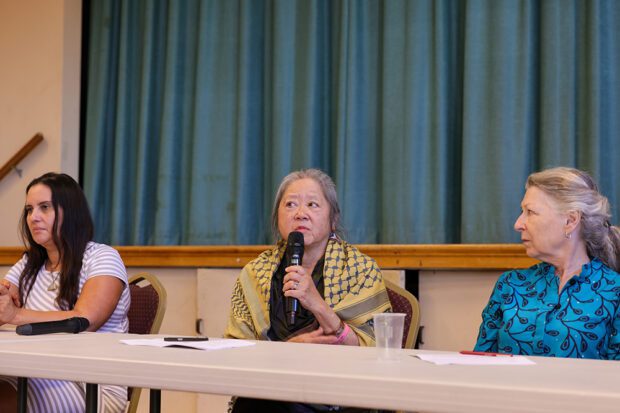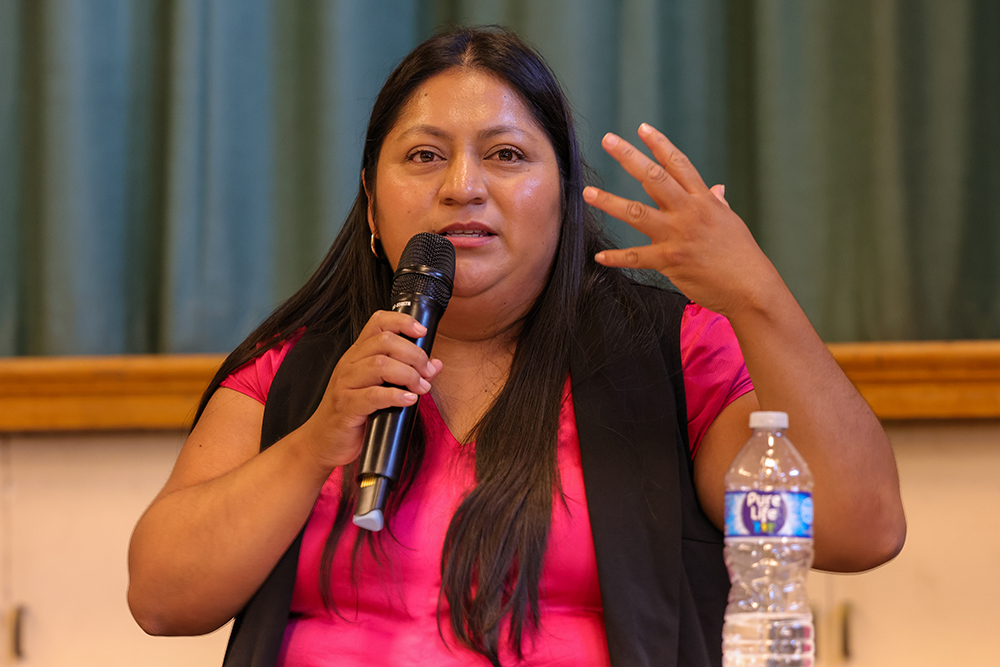
There are many expressions of resistance to the authoritarian takeover of the U.S. government. It is happening through demonstrations large and small, with investigative reporting, displayed in artistic statements, and revealed in historical reflections. The event called “Unheard Echoes: Silencing Due Process” combined those elements.
Organized by the Pan Valley Institute, it brought together a multimedia presentation, an original one-act play and a panel discussion covering the history of the Japanese incarceration, the significance of due process, the ongoing attack on civil rights and the impact of current immigration policies on Central Valley communities.
Participants braved the triple-digit heat wave to gather into the Big Red Church auditorium. They were treated to a one-act play, “My Relationship with America,” written and performed by the ArteVizm Collective. It featured a cast that reflects the cultural and ethnic diversity of the Central Valley.
Directed by Rodolfo Robles-Cruz and performed by Joshua Slack, Carlos Sanchez, Julian Hang, Shane Lara and Dalicia Torrecillas, the dialogue drew from historical sources and personal experiences.
Refreshingly honest viewpoints about the challenges of living in the United States expressed both pain and determination. The play envelops the attacks on civil liberties, the rule of law and equal justice that our nation and society are now facing head-on.
Bridging the injustices of our past and present was the task of an expert panel of social activists. Keiko Kubo laid the groundwork, sharing her family history of being swept up and herded into World War II concentration camps along with 125,000 Americans of Japanese descent.
Kubo is sansei, a third-generation Japanese born in the United States after the war. She recalls overhearing stories about the dire conditions of life and the humiliation heaped upon her people. Her family settled in Detroit after her father was sponsored by a Jewish family who owned a construction company.
She determined early-on to work for a world where that could never happen again. Inspired by that history, she has followed up with historical research trying to piece together what happened to her own family.
Now, Kubo works for Tsuru for Solidarity, a group of Japanese Americans fighting for the rights of migrants caught up in America’s inhumane detention facilities. It is a fitting name. Tsuru are Japanese cranes. The crane is a tall, elegant bird that symbolizes peace, luck and longevity, along with wisdom and loyalty.
Tsuru for Solidarity has done a lot of work exposing the deplorable conditions at the Northwest Detention Center in Tacoma, Wash., operated by the infamous GEO Group. Kubo emphasizes the collaboration between Tsuru and detainees in the facility.
Thousands of pages of written complaints by detainees testified to a wide spectrum of horrendous circumstances. Food that was spoiled, uncooked or wormy, deplorable medical care and sanitation, and sexual abuse were among them. Worse, uncaring staff, absence of oversight and a lack of transparency by GEO and by federal agencies.
Kubo says Tsuru continues that work in the Bay Area. “Now we are working with the ICE Out of Dublin Coalition to keep ICE from reopening a women’s federal prison as a detention center. We are organizing a rally in a park in Dublin with taiko drumming, art tables for kids and a program featuring a number of speakers.”

For most of us, taking our hard-won civil and personal rights for granted has come easily. That is until now. Local civil rights attorney Patience Milrod provided a history lesson showing just how much of a struggle it has been to obtain equal rights, universal justice and respect for diversity. How those worthy goals are still only partly realized. And how those values are now being ripped away before our very eyes.
Milrod began with a basic constitutional fact, “Civil rights are guaranteed to us. It doesn’t matter where we were born, what our race is, our sex, our gender, our sexual orientation—none of that matters. We’re all entitled to civil rights.”
She honed in on its historic roots. “We often use the term civil rights as a shorthand for movements that those of us with enough gray hair will remember. Those include the movement for Black Liberation, the Black Panthers, the Southern Christian Leadership Conference, all the way up to Black Lives Matter. The Chicano movement. Think about Cesar Chavez’s United Farm Workers [or] the Stonewall Uprising where people resisted a police raid on a gay bar.”
While the Constitution lays out this principle of equal treatment, Milrod emphasized, it cannot fix anything. “The law is on a piece of paper, it is in a book, it is pixels on a screen, but it does not jump out of the screen and rectify whatever problem that has been created by people’s bigotry.
“Laws are helpful only if there is political will to enforce them. And right at this moment, we are seeing a sad failure of political will to enforce equal rights. In fact, we are seeing a political will to roll back equal rights and impair people’s rights.”
We have been here before, Milrod pointed out as she recounted numerous historical cases of people fighting for equality and justice. “America has a long history of xenophobia and intolerance and bigotry that has taken legal forms as well as social forms.
“So, in 1863, there were draft riots in New York City. The Irish population rioted against the Black population because the Irishmen were angry that they were going to get drafted to fight in the Civil War.”
As the nation expanded to the Pacific, “Chinese folks had been brought to the United States to work in the gold rush, to work in mining, to build the railroads. That was in the 1850s and 60s. By the 1880s, all of a sudden they were becoming part of American society. And there were a lot of folks that had a lot of problems with that. And there were anti-Chinese riots.”
As the 1890s so-called Gilded Age rolled in, wealthy people could travel in luxurious Pullman train cars. Milrod recounted that when the economy sank, the company took it out on their workers.
“The Pullman workers were essentially captives of their employer. They lived on Pullman property. They bought groceries from a Pullman store. They were paid by the Pullman Company.
“There was a downturn. Their wages got cut, but none of their expenditures and payments out to the Pullman Company were reduced.
“They tried to go on strike. This time, the American Army intervened and crushed the strike. News reports and editorials commonly depicted the strikers as foreigners. The editors warned of mobs and aliens and anarchy and defiance of the law. So, it was a kind of similar rhetoric to what we’re seeing now.”
In the 20th century, the nation grew into an industrial and agricultural powerhouse. During World War I, Mexican immigrants were welcomed to perform much of the work, especially on farms. But when the Great Depression hit, Mexicans were no longer wanted. Milrod explained, “What happened during this period in the ’30s and early ’40s, was the same kind of sweeps that we are seeing now, the same kind of federal government, military and administrative interference in human life.
“Up to two million Mexicans and Mexican-Americans were deported. Between 60% and 70% of the people who were deported in these sweeps were citizens of the United States.”
With the coming of World War II, the United States reached out to Mexico again for workers to help save the country from fascism with the Bracero program. And yet again with the war’s end, another plan to deport Mexican workers was hatched up. This time, Operation Wetback was the venue for a racist purge of a hardworking population, Milrod explains.
“The head of the border patrol in 1953 was a guy named Harlon B. Carter. He was a convicted murderer. He had killed a Latino teenager in 1931, but why should that be a problem? He personally objected to the large number of Mexican immigrants, both legal and not, in the United States. And he undertook these huge sweeps, an effort at ethnic cleansing in 1953 and 1954, and 1.1 million people were returned to Mexico.”
Milrod contemplated our current predicament as well. “We have a long and shameful history of xenophobia and bigotry of politicians and media pandering to the ugliest layer of bottom feeders in the United States.
“Law enforcement trampling civil rights. The kinds of bodily harm the government can legitimately inflict on you are extremely limited. Yet we do not see any kind of self-control being demonstrated right now, and the courts are falling into line to some degree.”
She advised us that history can be a valuable teacher. “Frederick Douglass reminded us that if there is no struggle, there is no progress. Power concedes nothing without a demand. So, that’s our work.”
As another wave of deportation cruelty breaks upon the land, migrants and citizens alike are on edge and in harm’s way. Especially anxious are the young people who came to the United States as children and later qualified for the Deferred Action for Childhood Arrivals, or DACA, program, initiated during the Obama administration.

Brenda Ordaz is one of the estimated 538,000 DACA recipients in the country. Now, her future, along with all the others, is threatened like no time before.
Ordaz was born in Ensenada, Baja California, Mexico, and is the daughter of Zapoteco farmworkers. Her early years were shaped by constant migration until her family settled in Madera when she was 11 years old.
Ordaz is the community education and outreach coordinator for the Coalition for Humane Immigrant Rights, where she empowers and uplifts immigrant communities through education and advocacy.
Ordaz described what it is like to be in DACA. “It is like a pause and play button that only allows me to be here in the country, but does not give me the opportunity to travel outside of the U.S., for example, freely.
“We have to ask for advanced parole or a special permit to be able to travel or to go outside of the country. So that is a reality for many DACA, but also for the fully undocumented community.”
She shared a revealing perspective on shared experiences. “A lot of times we hear as an adjective the Latino community is so resilient. But I think that being resilient is not a good thing. It means that you had to struggle. It means that there are so many things that we have to overcome.
“So, I don’t want my children to be resilient because I don’t want them to have to go through all the things that I went through. Being resilient is a strong characteristic, [but] it’s not necessarily a good thing for a group or a community to go through that.”
Ordaz speaks for many with her simple appeal. “I think that as a DACA recipient and as an undocumented person in this country, I’m not just asking for permission to stay. I’m asking for the chance to live, to be seen, and to be heard. And I want us to learn from the past and not dwell in that shame but to rise in courage.”
With the Trump administration pushing against and exceeding the rule of law, immigration attorney Jessica Smith Bobadilla is seeing the legal game changing before her eyes. After working for the U.S. government, the United Nations and Human Rights Watch, she founded her own immigration law firm handling cases throughout the nation. She maintains her immigrant roots made it a natural fit.
Bobadilla observed that in 23 years dealing with immigration laws, she is now seeing an erosion of due process. “I’ve been in a lot of different jurisdictions. But in these last few months, I have seen more of a departure from due process than I’d seen under any of the prior administrations, Republican or Democrat, including under the first Trump administration.
“We’ve seen a lot of headlines recently about very random enforcement, and I did not find that kind of random enforcement before. We did not see agents pull up to a field and start terrorizing random workers and chasing them.”
Immigrants that are captured by ICE have a harder time now, she said. “There is a widespread effort to interfere with counsel. Obviously, immigration laws are complicated. So, to think that people without counsel, with all these hurdles now to access their counsel, and to get the right to counsel could have any chance of prevailing, I mean, forget language barriers, just the legal barriers are kind of ridiculous.”
Another tactic to deport people is called “expedited removal,” and it is worrisome for immigrant rights advocates. Bobadilla explains that expedited removal is something that allows government agents to remove people without a hearing, usually at a border.
“Most of those cases were originally people who had committed some form of fraud. Those orders carry a ban of either five to 10 years and are not appealable; they are not subject to judicial review by any court.”
Currently, immigration authorities are using that strongarm tactic to expedite the swift removal of asylum seekers with a legitimate case to stay in the United States.
Looking toward the future, Bobadilla advised all to keep up pressure on elected representatives to change outcomes. “We are all protecting due process by pushing for these protections, even when we’re not sure of the exact end game or why it matters.”

